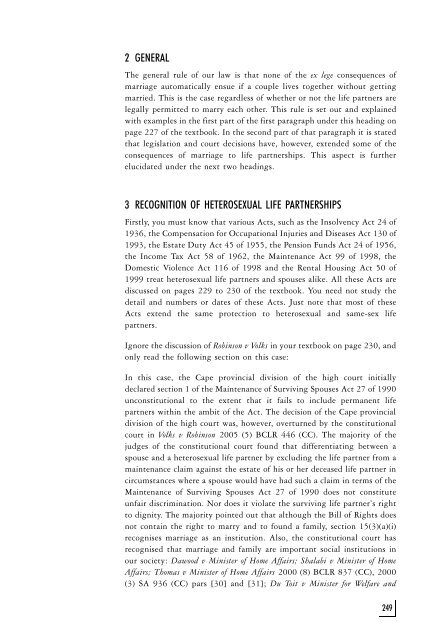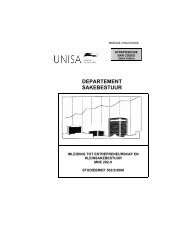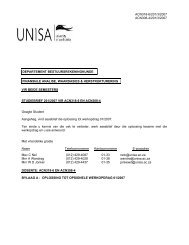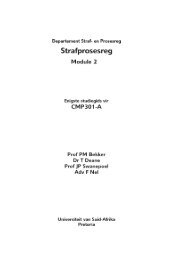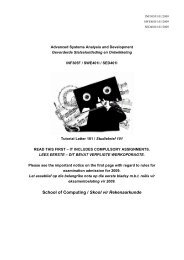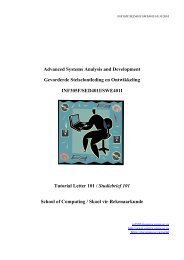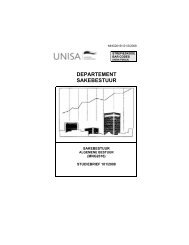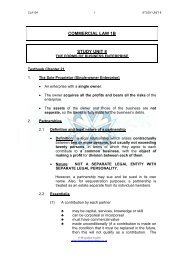key to the study guide - Name
key to the study guide - Name
key to the study guide - Name
You also want an ePaper? Increase the reach of your titles
YUMPU automatically turns print PDFs into web optimized ePapers that Google loves.
2 GENERAL<br />
The general rule of our law is that none of <strong>the</strong> ex lege consequences of<br />
marriage au<strong>to</strong>matically ensue if a couple lives <strong>to</strong>ge<strong>the</strong>r without getting<br />
married. This is <strong>the</strong> case regardless of whe<strong>the</strong>r or not <strong>the</strong> life partners are<br />
legally permitted <strong>to</strong> marry each o<strong>the</strong>r. This rule is set out and explained<br />
with examples in <strong>the</strong> first part of <strong>the</strong> first paragraph under this heading on<br />
page 227 of <strong>the</strong> textbook. In <strong>the</strong> second part of that paragraph it is stated<br />
that legislation and court decisions have, however, extended some of <strong>the</strong><br />
consequences of marriage <strong>to</strong> life partnerships. This aspect is fur<strong>the</strong>r<br />
elucidated under <strong>the</strong> next two headings.<br />
3 RECOGNITION OF HETEROSEXUAL LIFE PARTNERSHIPS<br />
Firstly, you must know that various Acts, such as <strong>the</strong> Insolvency Act 24 of<br />
1936, <strong>the</strong> Compensation for Occupational Injuries and Diseases Act 130 of<br />
1993, <strong>the</strong> Estate Duty Act 45 of 1955, <strong>the</strong> Pension Funds Act 24 of 1956,<br />
<strong>the</strong> Income Tax Act 58 of 1962, <strong>the</strong> Maintenance Act 99 of 1998, <strong>the</strong><br />
Domestic Violence Act 116 of 1998 and <strong>the</strong> Rental Housing Act 50 of<br />
1999 treat heterosexual life partners and spouses alike. All <strong>the</strong>se Acts are<br />
discussed on pages 229 <strong>to</strong> 230 of <strong>the</strong> textbook. You need not <strong>study</strong> <strong>the</strong><br />
detail and numbers or dates of <strong>the</strong>se Acts. Just note that most of <strong>the</strong>se<br />
Acts extend <strong>the</strong> same protection <strong>to</strong> heterosexual and same-sex life<br />
partners.<br />
Ignore <strong>the</strong> discussion of Robinson v Volks in your textbook on page 230, and<br />
only read <strong>the</strong> following section on this case:<br />
In this case, <strong>the</strong> Cape provincial division of <strong>the</strong> high court initially<br />
declared section 1 of <strong>the</strong> Maintenance of Surviving Spouses Act 27 of 1990<br />
unconstitutional <strong>to</strong> <strong>the</strong> extent that it fails <strong>to</strong> include permanent life<br />
partners within <strong>the</strong> ambit of <strong>the</strong> Act. The decision of <strong>the</strong> Cape provincial<br />
division of <strong>the</strong> high court was, however, overturned by <strong>the</strong> constitutional<br />
court in Volks v Robinson 2005 (5) BCLR 446 (CC). The majority of <strong>the</strong><br />
judges of <strong>the</strong> constitutional court found that differentiating between a<br />
spouse and a heterosexual life partner by excluding <strong>the</strong> life partner from a<br />
maintenance claim against <strong>the</strong> estate of his or her deceased life partner in<br />
circumstances where a spouse would have had such a claim in terms of <strong>the</strong><br />
Maintenance of Surviving Spouses Act 27 of 1990 does not constitute<br />
unfair discrimination. Nor does it violate <strong>the</strong> surviving life partner's right<br />
<strong>to</strong> dignity. The majority pointed out that although <strong>the</strong> Bill of Rights does<br />
not contain <strong>the</strong> right <strong>to</strong> marry and <strong>to</strong> found a family, section 15(3)(a)(i)<br />
recognises marriage as an institution. Also, <strong>the</strong> constitutional court has<br />
recognised that marriage and family are important social institutions in<br />
our society: Dawood v Minister of Home Affairs; Shalabi v Minister of Home<br />
Affairs; Thomas v Minister of Home Affairs 2000 (8) BCLR 837 (CC), 2000<br />
(3) SA 936 (CC) pars [30] and [31]; Du Toit v Minister for Welfare and<br />
249


